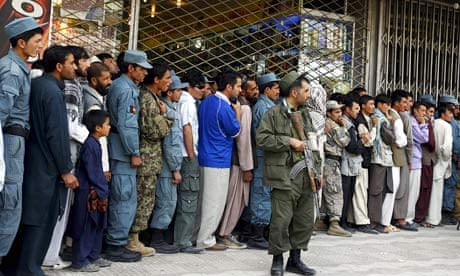Afghanistan's central bank has taken control of the troubled Kabulbank, its governor said today, after suspected irregularities raised concerns over the country's biggest private financial institution.
The central bank's governor, Abdul Qadir Fitrat, said investigations had been launched into the dealings of the bank's top two directors and shareholders, who were told to resign, and a brother of the Afghan first vice-president, Mohammad Qasim Fahim.
The Afghan government and the central bank had previously maintained that Kabulbank had not been taken over, despite a central bank official being appointed as chief executive.
Fitrat said today the bank had decided to step in after customers started a run on Kabulbank in the last two weeks. "Once we saw that people were anxious, then we thought it would be better to take it over. So it is good that we assured the people that their deposits are safe," he said.
Asked how long the central bank would remain in control, Fitrat said: "For the foreseeable future."
The Kabulbank chairman, Sher Khan Farnood, and chief executive, Khalilullah Fruzi, were told to resign amid media allegations of corruption.
The government and the central bank have previously said Farnood and Fruzi stepped aside in line with new financial regulations that said major shareholders could not hold management positions in a bank.
Fitrat had described reports in the US media of possible corruption at the bank as "baseless information and rumours". However, today he said Farnood, Fruzi and Fahim's brother, Mohammad Haseen, were under investigation for suspected irregularities.
"We will investigate any irregularities, any violations of the law of the central bank or any internal policies," he said.
Fitrat said the central bank was seeking help from the United Arab Emirates to freeze the assets of one of the two main shareholders, where the majority of his assets are located. He said this could apply to more shareholders with assets there.
US media reported last month that the central bank had attempted to seize luxury villas in Dubai worth $160m (£100m) that may have been bought with Kabulbank funds.
Concerns over dealings at Kabulbank, Fitrat said, had forced the central bank to institute the new regulations in June under which Farnood and Fruzi later stepped aside.
"We conduct our own investigation [and] once we see that there are elements of criminality involved, then we submit those cases to the attorney general's office," Fitrat said.
Farnood and Fruzi each own 28% of the bank. According to financial records on its website, the bank had total assets of $1.01bn and liabilities of $991m in 2009.
Fitrat insisted Kabulbank was still solvent and that its troubles would not spread to Afghanistan's other private lenders. "Fortunately, in other banks, mostly professionals are in charge. The good thing is that the other banks follow the rules," he said.
